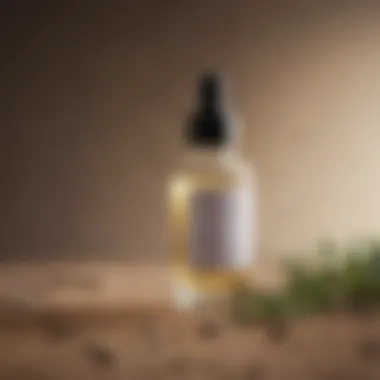Unlock the Secrets: The Astonishing Benefits of Biotin for Thinning Hair


Beauty Tips and Tricks
Biotin, a popular supplement known for its potential benefits in addressing hair thinning, has garnered significant attention in the beauty and wellness community. Individuals seeking to enhance the health and vitality of their hair may find incorporating biotin supplements into their routine a promising option. This section will delve into the effectiveness of biotin in combatting hair thinning, exploring the scientific rationale behind its efficacy and providing insights on integrating biotin for optimal results.
Biotin's role in promoting hair health stems from its function as a coenzyme in the body, essential for various metabolic processes that contribute to maintaining healthy hair growth. By nourishing hair follicles from within, biotin aids in strengthening hair strands and reducing the likelihood of breakage and thinning. Understanding how biotin interacts with the body's natural processes is crucial for individuals looking to address concerns related to hair thinning.
Developing a comprehensive beauty regimen that incorporates biotin supplementation requires a thoughtful approach. Consultation with a healthcare professional or a nutritionist is advisable to determine the appropriate dosage and ensure optimal results. Additionally, paying attention to potential side effects or interactions with other medications is important when embarking on a biotin regimen. By carefully integrating biotin into one's beauty routine, individuals can harness its potential benefits in promoting hair health and combatting thinning effectively.
Product Reviews
While biotin supplements offer a promising avenue for addressing hair thinning, selecting high-quality products is paramount for achieving desired results. In the realm of haircare products, the market provides a plethora of options infused with biotin, each claiming to nourish and revitalize hair. Conducting thorough research and reading product reviews can aid individuals in making informed decisions when choosing biotin-infused products.
Exploring peer reviews and expert insights on biotin-enriched shampoos, conditioners, and hair masks can offer valuable guidance in selecting products that align with specific haircare needs. Understanding the ingredients, formulation, and reputation of the brands producing biotin-infused hair products is key to identifying suitable options. By incorporating highly recommended biotin products into one's haircare routine, individuals can optimize the benefits of biotin and work towards achieving healthier, fuller-looking hair.
Incorporating biotin into one's beauty regimen requires a discerning approach towards selecting products that align with individual goals and preferences. By leveraging the insights provided through product reviews and recommendations, individuals can navigate the diverse landscape of biotin-infused haircare products effectively, enhancing their overall hair health and combating thinning hair with confidence.
Understanding Thinning Hair
Thinning hair is a common concern that impacts many individuals, especially women. It is crucial to grasp the underlying causes and implications of this condition to effectively address it. Understanding thinning hair involves delving into various factors that contribute to this issue, such as genetic predispositions, hormonal imbalances, and nutritional deficiencies. By comprehending these causes, individuals can make informed decisions regarding their hair care routines and seek appropriate solutions.
Causes of Thinning Hair
Genetic Factors
Genetic factors play a significant role in determining an individual's susceptibility to hair thinning. These hereditary influences can affect the hair follicles' lifespan and growth cycle, leading to progressive hair loss over time. Understanding the genetic component of thinning hair is crucial for tailoring personalized treatment approaches that target the root cause of the issue. While genetic factors may pose challenges in maintaining hair density, advancements in hair care science have paved the way for innovative solutions to mitigate the impact of genetic predispositions.


Hormonal Imbalance
Hormonal imbalances can disrupt the normal cycle of hair growth and contribute to hair thinning. Fluctuations in hormone levels, such as increased dihydrotestosterone (DHT) production or imbalances in estrogen and progesterone, can negatively impact hair follicles' health and vitality. Addressing hormonal imbalances is essential in managing thinning hair effectively. By identifying the specific hormonal factors contributing to hair loss, individuals can choose targeted treatments that rebalance hormone levels and promote hair regrowth.
Nutritional Deficiencies
Nutritional deficiencies, such as inadequate intake of essential vitamins and minerals, can impair hair health and contribute to thinning hair. Nutrients like biotin, iron, zinc, and vitamin D play crucial roles in supporting hair growth and maintenance. Insufficient levels of these nutrients can weaken the hair strands, leading to increased fragility and breakage. Integrating nutrient-rich foods and supplements into one's diet can help address nutritional deficiencies and promote optimal hair growth. By addressing these underlying causes of thinning hair, individuals can take proactive steps towards improving the health and appearance of their hair.
Impact on Confidence and Self-Esteem
Thinning hair can have profound psychological effects on an individual's confidence and self-esteem. The visible signs of hair loss can erode self-confidence and create feelings of self-consciousness and insecurity. Understanding the emotional impact of thinning hair is vital in addressing not just the physical aspects of the condition but also the mental and emotional well-being of individuals. By acknowledging the psychological effects of hair loss, individuals can explore holistic approaches to hair care that support both physical revitalization and emotional resilience.
Exploring the Role of Biotin
As we delve into the realm of biotin, it is crucial to understand its pivotal role in combatting hair thinning. Biotin, also known as Vitamin B7, is a water-soluble vitamin that is integral for various bodily functions. In the context of hair health, biotin plays a significant role in supporting the structure of keratin, the protein that makes up hair strands. Moreover, biotin contributes to the maintenance of overall scalp health, fostering an environment conducive to hair growth.
What is Biotin?
Biotin, classified as a B vitamin, is essential for converting nutrients into energy within the body. Also referred to as Vitamin H, biotin is renowned for its ability to strengthen hair and nails. It acts as a coenzyme in numerous biochemical reactions, aiding in the production of fatty acids required for healthy hair growth. Biotin deficiency can manifest in symptoms like hair loss and brittle nails, emphasizing the importance of adequate biotin intake for optimal hair health.
Scientific Evidence
Biotin and Keratin Production
The interaction between biotin and keratin production is a cornerstone of why biotin is heralded in hair care. Keratin, as the building block of hair strands, relies on biotin for its synthesis. This symbiotic relationship highlights how biotin fosters strong, resilient hair strands, reducing the likelihood of breakage and hair loss. By supporting keratin production, biotin contributes to enhancing hair quality and promoting growth.


Biotin Deficiency and Hair Loss
A deficiency in biotin can culminate in hair loss, shedding light on the critical link between biotin levels and hair health. Ensuring adequate biotin levels is imperative to prevent hair thinning and bolster hair follicle strength. Biologically, biotin deficiency disrupts the hair growth cycle, leading to weakened hair strands and eventual shedding. By addressing biotin deficiency, individuals can mitigate hair loss and rejuvenate hair health.
How Biotin Addresses Thinning Hair
Biotin intervenes in the process of hair thinning by fortifying hair follicles and promoting healthy hair growth. By nourishing the scalp and supporting keratin production, biotin works to revitalize weakened hair strands and combat thinning. Its role in enhancing overall scalp health also creates a conducive environment for robust hair growth. Incorporating biotin into hair care routines can significantly improve the density and quality of hair strands over time.
Incorporating Biotin into Your Beauty Routine
Incorporating Biotin into Your Beauty Routine plays a crucial role in addressing hair thinning issues effectively and promoting overall hair health. By focusing on essential elements like biotin-rich foods, supplements, and topical applications, individuals can nurture their hair from within while taking external measures to improve its condition. This strategic approach ensures a comprehensive hair care routine that targets the root causes of thinning hair, offering long-term benefits and sustainable results.
Natural Food Sources of Biotin
Including natural food sources of biotin in your diet is a fundamental step in enhancing your hair health. Foods such as eggs, nuts, seeds, and avocados are rich in biotin, providing your body with the necessary nutrients to support hair growth and strength. By consciously incorporating these biotin-packed foods into your meals regularly, you can naturally boost your biotin levels and contribute to combating hair thinning from the inside out.
Supplements and Dosage
Supplements offer a convenient way to ensure adequate biotin intake, especially for individuals with specific dietary restrictions or limitations. When choosing biotin supplements, opt for high-quality products from reputable brands to guarantee effectiveness and safety. It is crucial to follow the recommended dosage guidelines provided on the supplement packaging or as advised by a healthcare professional to avoid potential side effects and maximize the benefits of biotin supplementation.
Topical Applications
Incorporating biotin into your beauty routine through topical applications can directly target the scalp and hair follicles, promoting stronger and healthier hair growth. Biotin-infused shampoos, conditioners, and serums can nourish the scalp, improve hair texture, and enhance overall hair quality. When selecting topical biotin products, prioritize formulations free from harmful chemicals and sulfates to ensure optimal results without compromising the health of your hair and scalp.
Consulting with a Professional


Thinning hair can be a complex issue, often requiring expert guidance to navigate effectively. Consulting with a professional, such as a dermatologist specializing in hair health or a hair care specialist, is paramount in understanding the root cause of hair thinning and formulating a targeted treatment plan. Professionals in the field possess the expertise to assess your specific situation, whether it be due to genetic predispositions, hormonal imbalances, or nutritional deficiencies. Their insights offer a personalized approach to combating hair thinning, ensuring that you receive informed recommendations tailored to your unique needs and circumstances.
When seeking advice from a dermatologist, you benefit from their in-depth knowledge of skin and hair conditions. Dermatologists are equipped to evaluate your scalp health, diagnose any underlying issues contributing to hair thinning, and recommend relevant treatments or lifestyle adjustments. Their recommendations often include medical-grade products, prescription medications, or advanced procedures to address hair loss effectively. By consulting with a dermatologist, you gain access to evidence-based solutions backed by scientific research, enhancing the efficacy of your hair care regimen.
Hair care specialists, on the other hand, offer specific insights into maintaining healthy hair and scalp. These professionals focus on the practical aspects of hair care, such as suitable products, styling techniques, and routine maintenance practices. Consulting with a hair care specialist can provide valuable tips on promoting hair growth, preventing further thinning, and preserving the overall health of your hair. Their expertise may encompass holistic approaches to hair care, incorporating natural remedies or specialized treatments to optimize hair strength and vitality. Overall, seeking guidance from a hair care specialist complements the advice given by dermatologists, contributing to a comprehensive strategy for combating hair thinning and promoting hair health.
Dermatologist Recommendations
Dermatologists play a crucial role in addressing hair thinning, offering expert advice and recommendations tailored to individual needs. When consulting with a dermatologist, they conduct a thorough examination of your scalp and hair to identify the underlying causes of hair loss or thinning. Based on their assessment, dermatologists recommend specific treatments, such as topical solutions, oral medications, or procedural interventions. These recommendations aim to target the root cause of hair thinning, promoting regrowth and improving overall hair health.
In addition to treatment suggestions, dermatologists may advise on lifestyle modifications that can support hair growth and prevent further thinning. This could involve dietary changes to ensure adequate intake of essential nutrients for hair health, stress management techniques to reduce hair loss due to chronic stress, or recommendations for proper hair care practices to minimize damage and breakage. By following dermatologist recommendations closely, individuals experiencing hair thinning can enhance the effectiveness of their treatment plan and achieve long-lasting results.
Hair Care Specialist Insights
Hair care specialists offer valuable insights into maintaining healthy hair and preventing hair thinning through effective care routines. These professionals specialize in understanding the unique properties of different hair types and textures, providing personalized advice on grooming practices and product selection. By consulting with a hair care specialist, individuals can learn optimal methods for cleansing, conditioning, and styling their hair to minimize damage and support growth.
Hair care specialists also educate clients on identifying signs of hair distress, such as split ends, breakage, or scalp irritation, and recommend appropriate interventions to address these issues. They may suggest targeted treatments, such as deep conditioning masks, scalp serums, or protective styling techniques, to promote hair strength and resilience. Additionally, hair care specialists stay updated on the latest industry trends and innovations, enabling them to recommend cutting-edge products or procedures that can benefit individuals dealing with hair thinning.
Overall, consulting with a hair care specialist equips individuals with the knowledge and tools needed to prioritize hair health and address specific concerns related to hair thinning. By incorporating their insights into a personalized hair care routine, individuals can nurture their hair back to health, improve its appearance and texture, and regain confidence in their overall hair aesthetics.
Final Thoughts on Biotin and Hair Health
In the culmination of delving into the effectiveness of biotin for combatting thinning hair, it becomes evident that final reflections on biotin and hair health are paramount. Understanding the synergy between biotin and hair revitalization is crucial for individuals seeking to address hair thinning issues comprehensively. By examining sustainable strategies for incorporating biotin into daily routines, individuals can unlock the full potential of this essential vitamin in enhancing hair health.
Sustainable Strategies for Hair Care
Embarking on a journey towards optimal hair care involves the implementation of sustainable strategies that promote long-term vitality and strength. Integrating biotin-rich foods into one's diet, such as eggs, nuts, and leafy greens, can provide a natural source of this hair-nourishing vitamin. Additionally, ensuring adequate hydration and a nutrient-rich diet contributes to overall hair health and resilience. Selecting hair care products that contain biotin or opting for supplements under the guidance of a healthcare professional can augment these efforts and promote sustained hair wellness.
Long-Term Benefits of Biotin
Exploring the long-term benefits of incorporating biotin into beauty regimens unveils a spectrum of positive outcomes for hair health. Consistent biotin intake strengthens hair follicles, reduces brittleness, and supports hair growth, leading to lustrous and voluminous locks over time. Moreover, the nourishing properties of biotin extend beyond external appearance, promoting overall hair strength and resilience from within. By prioritizing the integration of biotin into daily hair care routines, individuals can experience enduring benefits that speak to the essence of sustained hair vitality and radiance.







